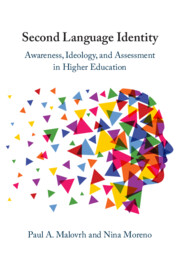Book contents
- Second Language Identity
- Second Language Identity
- Copyright page
- Dedication
- Contents
- Figures
- Tables
- Preface
- Acknowledgments
- 1 On Actors, Architecture, and L2 Advancedness in Higher Education
- Part I Advancedness and the L2 Learner
- 2 Advancedness, Advanced Proficiency, and L2-Spanish Learner Identity
- 3 A Quantitative Analysis of L2 Learners’ Beliefs Regarding Advanced L2-Spanish and Their Perceptions of Advancedness
- 4 Can L2 Learners Imagine Advancedness?
- Part II Variable Notions of Advancedness
- Part III Assessment, Identity, and Critical Language Awareness As Markers of Advancedness
- Book part
- Bibliography
- Name Index
- Subject Index
2 - Advancedness, Advanced Proficiency, and L2-Spanish Learner Identity
from Part I - Advancedness and the L2 Learner
Published online by Cambridge University Press: 27 July 2023
- Second Language Identity
- Second Language Identity
- Copyright page
- Dedication
- Contents
- Figures
- Tables
- Preface
- Acknowledgments
- 1 On Actors, Architecture, and L2 Advancedness in Higher Education
- Part I Advancedness and the L2 Learner
- 2 Advancedness, Advanced Proficiency, and L2-Spanish Learner Identity
- 3 A Quantitative Analysis of L2 Learners’ Beliefs Regarding Advanced L2-Spanish and Their Perceptions of Advancedness
- 4 Can L2 Learners Imagine Advancedness?
- Part II Variable Notions of Advancedness
- Part III Assessment, Identity, and Critical Language Awareness As Markers of Advancedness
- Book part
- Bibliography
- Name Index
- Subject Index
Summary
Advancedness--high-level language use sophisticated enough to adapt to a variety of sociocultural contexts--encapsulates essential elements of L2 learners’ identity. Advanced proficiency, on the other hand, refers to learners’ communicative ability as determined by formal assessments via pre-established criteria (Brown, Thompson, & Cox, 2021). In addition, the term ‘advanced’ has been erroneously defined by non-experts as being ‘fluent’ or ‘bilingual.’ Conflicting definitions reflect varying perspectives among professionals involved in language programs, which could hinder the establishment of curricula and appropriate assessment metrics. After reviewing the most commonly-used assessment scales (ACTFL, CEFR, and ILR), the chapter focuses on what research has found regarding sociocultural and psycholinguistic individual differences, such as study abroad as well as extracurricular habits and behaviors, pre-tertiary education, age of onset, aptitude, motivation, perseverance, and L2 grit. Other facilitating factors are also mentioned, such as equity in accessing extracurricular opportunities; better academic advising, and acknowledgment of the learners’ construction of an L2 identity.
Keywords
Information
- Type
- Chapter
- Information
- Second Language IdentityAwareness, Ideology, and Assessment in Higher Education, pp. 13 - 32Publisher: Cambridge University PressPrint publication year: 2023
